
This is the third in a rotating series of The Shadow Two-Minute Mysteries. Pit your mind against that of The Shadow. This is the version of The Shadow that appeared in the pulp magazine stories. Harry Vincent is an agent. Burbank is in charge of communications. And there’s no mention of “clouding men’s minds.”
This mini-mystery originally appeared on my old Shadow in Review website. But that was years ago, and I suspect even if you remember it, you may have forgotten the vital clue. For those of you with a memory sharper than mine, you may remember it.
The solution, not necessarily the only solution, but the one the author had in mind, will appear (below) next Friday. That gives you time to mull over the crime.
Feel free to leave your solution in the comments section below. It could be better than mine!
There are some background notes at the end of the story. They’ll explain a bit more about Harry Vincent, who is featured in this mystery, and his part in the larger universe of the pulp Shadow.
You are about to enter the pulp world of the 1930s. Join The Shadow as he dons his black cloak, slouch hat, and gloves, and prepares to battle crime. It’s time for action and mystery. The Shadow knows!
Laboratory of Evil
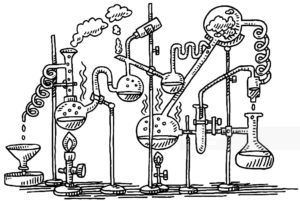
The lights of Manhattan glimmered in the damp night air. Inside the brownstone mansion of Dr. Franz Vodost, Harry Vincent sat at a typing desk. He was undercover for The Shadow, working as secretary to Dr. Vodost.
A short, stout man burst into the room. It was Gunther, the doctor’s lab assistant. “Quick,” he gasped. “Dr. Vodost… gas…”
Harry followed him down a short hallway that terminated in a laboratory door. A reinforced glass window was marked “Do Not Enter” in large letters. Gunther pushed open the door and the two men entered.
On the floor in the center of the cluttered lab lay the body of a tall man wearing a clean laboratory smock. Vincent bent over him. “He’s dead.”
“It was the carbon dioxide,” explained Gunther, still breathing heavily. “I barely escaped with my own life.”
“Carbon dioxide isn’t normally poisonous.” Vincent looked for Gunther’s reaction.
The assistant leaned weakly against a tall lab stool. “Not generally, unless there is a deficiency of oxygen. And the lab was sealed.
“Dr. Vodost and I were working on several experiments at once. We were generating carbon dioxide on this equipment” — he gestured to a table filled with apparatus near the side of the room — “and while that was going on, we began work on Dr. Vodost’s latest chemical experiment.”
He reached over and indicated a dangling rubber hose. “Apparently this tubing accidentally came loose without either of us noticing it. The gas, colorless and odorless, filled the room. It was only when I saw Dr. Vodost pass out and slump to the floor that I realized the danger.”
Vincent stepped over to the table to examine the device. There was no sign of tampering.
“I rushed from the room, activating the evacuation fan on the way out.” Gunther indicated a large red button on the wall by the door. “The fans quickly swept the excess gas from the room and replenished the oxygen. I ran to get you.”
“A terrible accident,” muttered Vincent. “I’ll phone the police.”
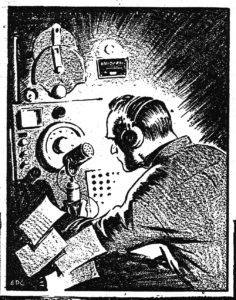
Back in the study, he reported the death to headquarters. Then, making sure he wasn’t observed, he dialed a second number. This telephone number was unrecorded in any telephone book. Vincent was reporting to The Shadow.
The Shadow’s contact man, Burbank, answered with but a single, monotoned word: “Report.”
Harry made his report to his master. He described the scene of death in detail, then hung up awaiting further orders.
Shortly, the phone rang. Vincent picked it up quickly. From the receiver came the whispered voice of The Shadow:
“When the police arrive, have them hold Gunther. This was no accident; it was murder.”
WHY DOES THE SHADOW CLAIM MURDER?
■ ■ ■
[learn_more caption=”Click here for the solution.”] Carbon dioxide is heavier than air. Gunther was a short man; Vodost was tall — thus Gunther should have been affected before Dr. Vodost. The Shadow suspects that Gunther intentionally disconnected the rubber tubing, releasing the gas. He could easily have then left the room and watched through the window until he saw Dr. Vodost succumb to the lack of oxygen before summoning aid. The Shadow knows![/learn_more]
Background notes
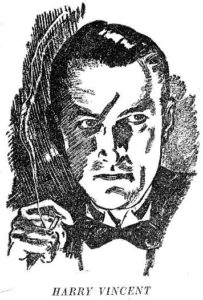
In this story, Harry Vincent was acting as secretary for Dr. Vodost. In his 19-year career, Vincent took a variety of jobs in the line of duty for The Shadow. He was young, probably in his late 20s or early 30s, and was a good looking chap. This enabled him to fit into a wide variety of situations.
In the earliest stories, he often posed as a salesman. His charm and looks let him fit in well with Manhattan’s society set, and he could easily assume the role of man-about-town. He uses that charm in the 1936 story “The Gray Ghost” where he appeared as a young playboy.
He could make friends easily, and gain their confidence. The Shadow often used that ability to his advantage, as Vincent could gather information that was confidential. The 1932 story “The Blackmail Ring” is a good example, where Harry worked together with Stuart Bruxton, a young man who accidentally stumbled into a dangerous situation.
Vincent was handy with firearms and with his fists. That made him a convenient agent to call upon when The Shadow needed someone to help guard an innocent person put into danger. Such an occurrence was in the 1931 story “The Shadow Laughs” when Vincent watched over young Blair Windsor. Later in 1931 he protected Professor Whitburn in “The Red Menace.”
Upon occasion, Vincent would help infiltrate the underworld. He could pass for a gangster when the situation required it. In 1931’s “Gangdom’s Doom” Harry was insinuated with Frank Marmosa, a gambling king. And in the 1937 story “Crime, Insured,” he got to do a little jewel robbery.
Harry was not only dependable, but he was highly intelligent as well. He could be counted on when information was needed. In 1932’s “Dead Men Live,” for example, The Shadow sent him overseas to do research by himself.
Harry was often sent out in advance of The Shadow to scout out the situation. That happened in the 1933 story “Isle of Doubt,” when Harry headed off to Mississippi and again in “The Golden Grotto” published the same year. In that story Harry scouted an area of the east coast for pirate loot.
On several occasions, Vincent even got to be The Shadow for a brief time. The first of such instances was in the 1935 story “Atoms of Death” when he donned the slouch hat and black cloak. All to convince gangsters who had captured The Shadow in his Cranston disguise that they were holding an innocent man. He again wore the black garb in the 1938 story “The Crystal Buddha.”
When author Walter Gibson created the character of Harry Vincent, he chose the name Harry in honor of his good friend and master magician Harry Blackstone.
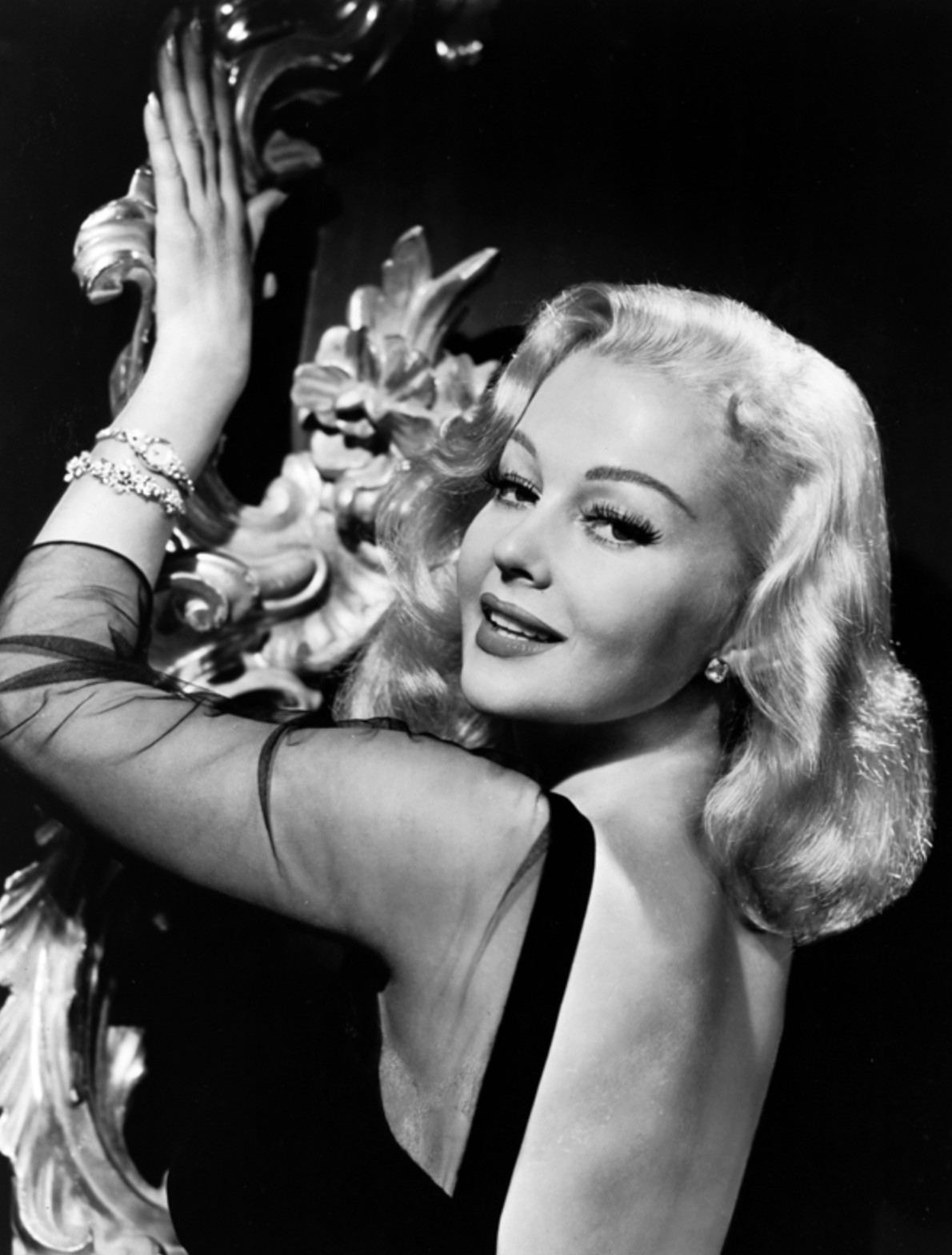
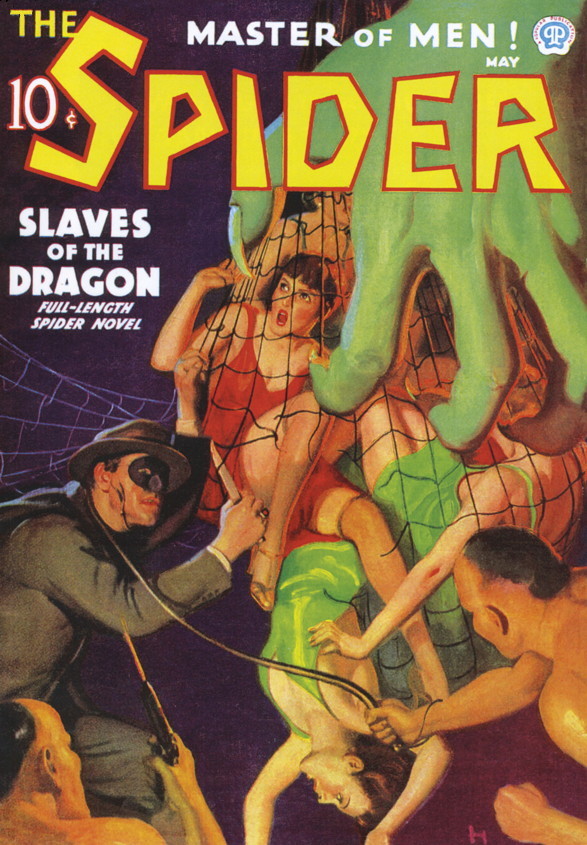

If Vodost was conked out by the carbon dioxide, Gunther should’ve passed out as well. That he wasn’t proves he planned it as murder. The Shadow knows!